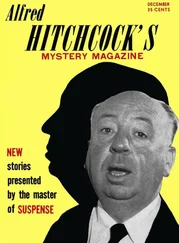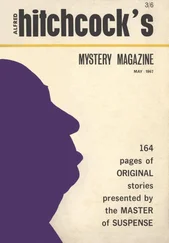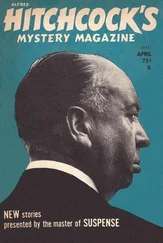Брендан Дюбуа - Alfred Hitchcock’s Mystery Magazine. Vol. 51, No. 7 & 8, July/August 2006
Здесь есть возможность читать онлайн «Брендан Дюбуа - Alfred Hitchcock’s Mystery Magazine. Vol. 51, No. 7 & 8, July/August 2006» весь текст электронной книги совершенно бесплатно (целиком полную версию без сокращений). В некоторых случаях можно слушать аудио, скачать через торрент в формате fb2 и присутствует краткое содержание. Город: New York, Год выпуска: 2006, ISBN: 2006, Издательство: Dell Magazines, Жанр: Детектив, на английском языке. Описание произведения, (предисловие) а так же отзывы посетителей доступны на портале библиотеки ЛибКат.
- Название:Alfred Hitchcock’s Mystery Magazine. Vol. 51, No. 7 & 8, July/August 2006
- Автор:
- Издательство:Dell Magazines
- Жанр:
- Год:2006
- Город:New York
- ISBN:0002-5224
- Рейтинг книги:4 / 5. Голосов: 1
-
Избранное:Добавить в избранное
- Отзывы:
-
Ваша оценка:
- 80
- 1
- 2
- 3
- 4
- 5
Alfred Hitchcock’s Mystery Magazine. Vol. 51, No. 7 & 8, July/August 2006: краткое содержание, описание и аннотация
Предлагаем к чтению аннотацию, описание, краткое содержание или предисловие (зависит от того, что написал сам автор книги «Alfred Hitchcock’s Mystery Magazine. Vol. 51, No. 7 & 8, July/August 2006»). Если вы не нашли необходимую информацию о книге — напишите в комментариях, мы постараемся отыскать её.
Alfred Hitchcock’s Mystery Magazine. Vol. 51, No. 7 & 8, July/August 2006 — читать онлайн бесплатно полную книгу (весь текст) целиком
Ниже представлен текст книги, разбитый по страницам. Система сохранения места последней прочитанной страницы, позволяет с удобством читать онлайн бесплатно книгу «Alfred Hitchcock’s Mystery Magazine. Vol. 51, No. 7 & 8, July/August 2006», без необходимости каждый раз заново искать на чём Вы остановились. Поставьте закладку, и сможете в любой момент перейти на страницу, на которой закончили чтение.
Интервал:
Закладка:
So things went from bad to worse and worse to abysmal. What with the competition cutting our throats, the gigantic rents we were paying, the vast amounts we were each taking out of the business, the increasingly sour meetings we were having with the bank, I suppose we were technically insolvent.
I was sitting in my cubbyhole of an office one morning, reading the appalling cricket news and scanning the runners and riders at Aintree, when Gerald came in and sat down heavily in the other chair. He had been for a meeting with the accountants.
“Well?” I said, knowing what the answer would be.
He shook his head.
“England all out for a hundred and eighty,” he said, reading the paper upside down. “Typical.”
“No,” I said, a bit irritated, “with the accountants.”
“Bunch of dismal jimmies,” he said. “I’ve been meaning to sack them for ages.”
“They say?”
“They say we should put the keys under the door and call it a day. That we cannot cover our liabilities and that therefore we are technically insolvent. ‘And as you know, Mr. Hawthorne,’ ” he mimicked savagely, “ ‘to continue trading while insolvent is a serious offence.’ Blah, blah, blah.”
“Right, then,” I said. “We’re belly up.”
“Not as long as I’m still standing up,” he said. “All we need is a shot in the arm, a breathing space.”
“Yes,” I said, without much conviction.
“What we need, Pete,” he said, “is a robbery.”
“How would that help?” I said. “Unless you’re thinking about the publicity.”
“Nah, bugger the publicity,” he said. “What we need is a robbery.” And he waggled two fingers of each hand in the air as he said “robbery.”
I stared at him. “You’re mad,” I said.
“Not mad at all, dear old thing. Just being practical, that’s all. Just an idea.”
“You’re actually suggesting that we stage a — a what — a smash and grab?”
“Nothing so dramatic,” he said. “A simple, well-conducted robbery is all.”
“And how would that help?” I said. “If it came off — if — we’d get the insurance. But that’s all.”
“Not if the really good stock was in my safe back at the house. You see?”
I saw.
“And afterwards, you do what, you flog the stock?”
He nodded.
“Willi Leppers in Bruges would handle it. I know for a fact he’s well bent. But he’s quiet.”
I considered for a bit, and that was probably my big mistake. I should have turned him down straightaway.
“And who’s going to do the dirty deed? You have anyone in mind?”
Gerald smirked.
“That’s the easy part. I could find half a dozen blokes who’d be up for a doddle like this. For a flat fee, of course, no shares.”
I was sure he could. Gerald’s acquaintances included several people I wouldn’t give house room to.
So there it was. Gerald’s answer to our problems. There was no doubt it was an answer, or would be. If, of course, he could find someone who would do it. If he could sell the story to the insurance company. If they believed it. If he could get rid of the stock. Actually, that was the part I had the least problem with. Gerald’s contacts abroad, particularly in Belgium, were excellent. He had a little black book at home with literally hundreds of names in it, merchants, buyers, little two-man firms he’d done business with once.
I blew out my breath.
“You do realize,” I said to him, “what we’d be in for if they caught on?”
“They won’t,” he said. “There’ll be just the three of us. You, me, and whoever. Nobody else gets a whisper. But the important thing is that it rings true.”
And he told me his plan, or rather the broad outlines of his plan, because there were, at the beginning, some glaring holes big enough to drive a police car through.
“It’s foolproof,” he said. “And it’s a classic M.O. Works every time.”
M.O. He was talking like a character from John Creasey now. He was really enjoying himself, was Gerald, doing the criminal mastermind, the Planner.
But I had to admit that the wives-as-hostages part of the idea was quite good. It seemed to be a well-established technique. I had read only weeks before about a gang who had done the same thing to a Barclays Bank manager. And using the CCTV cameras to back up our story was also neat. Gerald had had them installed nine months before, and I had squawked a bit at the cost, but in fact they were going to help the plan along, if the plan went ahead. I wondered a bit belatedly if Gerald had already had this in mind when he installed the system, if he’d been planning this for the last nine months. I wouldn’t have put it past him.
“If you can find somebody we can depend on,” I said, “I’ll think about it.”
“Trust me,” he said. “I’ve got a bloke in mind.”
Of course he had. He’d had somebody in mind even before he opened his mouth to me. Trust Gerald. Well, yes, as far as it goes.
I suppose that I allowed myself to be dragged along by Gerald. At any rate, I agreed to discuss the thing with him, the “job” as he called it, in the following week. Then one day, he came back after lunch with a self-satisfied look on his face.
“I’ve found him,” he said.
“Who?”
“The bloke who’s going to do the job.”
And now suddenly it was real. I felt that things were going too fast for me.
Gerald said, “You and Paula come round for dinner on Thursday.”
“This Thursday?” I said. This was much too fast for me.
“’Course this Thursday. No point in hanging about. My bloke’s up for it and he wants to get on with it as well. And,” he said, “guess what? Old Mother Bellingham’s brought her diamonds in for cleaning and a bit of resetting work. It couldn’t have happened at a better time. Even broken up that stuff’s worth a good hundred grand.”
Old Mother Bellingham, as Gerald called her, was the widow of a former Lord Mayor, who had also inherited her defunct husband’s textile business. She was an old client of Gerald’s father, and reading between the lines, I suspected that she might have been more than a client. She was now in an advanced state of decomposition, but she still owned a fortune in jewels, and she came in regularly, loyally, to have them cleaned.
I could see with the Bellingham diamonds in the strong room, it was a good time to act. “But,” I said, “shouldn’t I–I mean, don’t you want me to meet him, this bloke of yours?”
“No point,” Gerald said briefly. “You’ll be seeing him soon enough. It’s all set up. He’s going to have a walk around the shopping center, have a gander at the shop.”
“Listen,” I said, “are we really sure we want to go ahead with this?”
“I am, squire,” he said, “and you’d better be sure too, because on Thursday the balloon goes up. Dinner at eight thirty, you and Paula, right?”
But what I hadn’t expected was the Claverhouses. And neither had the big man.
“I thought we needed a bit of independent corroboration,” Gerald said.
“I hope there aren’t going to be any more nasty little surprises like that,” the man called Carl said. “I’m not keen on them.”
Gerald looked sideways at him and nodded at the ski mask in Carl’s hand.
“You are going to put that back on, aren’t you?”
“When it’s time,” Carl said.
I suddenly had the feeling that Gerald wasn’t quite as in charge of the situation as he’d like to be. And that the man knew more about what he was doing than Gerald. Gerald had the same feeling apparently because he changed gear viciously to start the descent into town. He said, “I hope your mate is as competent as you are.”
Читать дальшеИнтервал:
Закладка:
Похожие книги на «Alfred Hitchcock’s Mystery Magazine. Vol. 51, No. 7 & 8, July/August 2006»
Представляем Вашему вниманию похожие книги на «Alfred Hitchcock’s Mystery Magazine. Vol. 51, No. 7 & 8, July/August 2006» списком для выбора. Мы отобрали схожую по названию и смыслу литературу в надежде предоставить читателям больше вариантов отыскать новые, интересные, ещё непрочитанные произведения.
Обсуждение, отзывы о книге «Alfred Hitchcock’s Mystery Magazine. Vol. 51, No. 7 & 8, July/August 2006» и просто собственные мнения читателей. Оставьте ваши комментарии, напишите, что Вы думаете о произведении, его смысле или главных героях. Укажите что конкретно понравилось, а что нет, и почему Вы так считаете.












